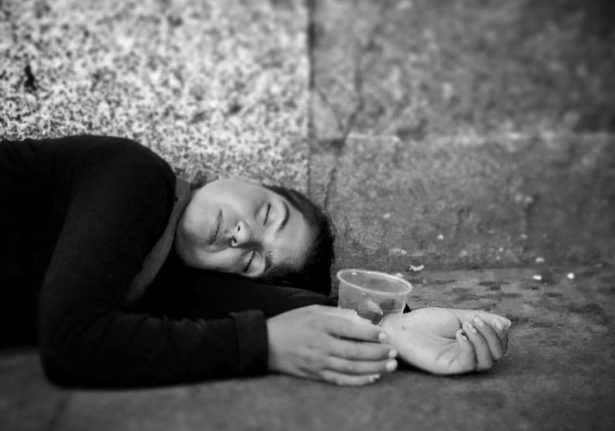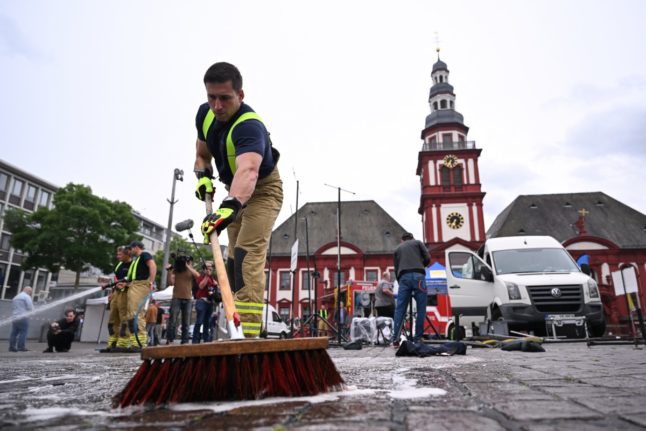But what he didn’t count on was that he would meet a group of people that would have such a profound influence on his everyday life and work.

The man behind the lens: Damanti taking a selfie with his new friends.
“In 2015 I was an outsider in this country, trying to learn the language and find work. A chance encounter soon changed that, forming the beginnings of a long-term photographic series about Romani population in Europe, he told The Local.
“Walking home one day from another disappointing day of cliche photos, I came across a Roma Girl sleeping on the ground holding an old change cup. Her name was Sibella. I knelt down to take her photograph and as I stood up I noticed another Roma-girl walking right towards me saying, “What are you doing? That is my sister!” That was the day I met the “Cobadin-Girls of Sol”.

“Over the next four years I met with them every day, carefully documenting their story and gradually becoming absorbed into their lives. We have been through births, deaths, arrests, fights and the day to day struggles we all endure.”
What he has produced is a remarkable set of photographs of a group of people who are at best invisible to society and at worst, the frequent targets of abuse.
At first, he approached them with handmade signs with witty slogans, such as 'freewifi' and '#Brexit: Keep calm and give me money' to replace the ineffectual ones they had written themselves.

“This was the way into their lives, I noticed their signs were incredibly long (5-6 lines) and 100 percent trite and boring. No one was reading them. So I offerend alternatives, lighthearted signs with quick simple messages in English for the tourists. This began the friendship.”
But it soon developed into a deeper friendship, one in which they invited him to dine with the family group as they cooked up stews in cardboard shelters under the roadside bridges where they sleep at night.
He even introduced them to the concept of birthday parties, after realising that for the most part, they didn’t even know how old they were, let alone celebrate the occasion.
“I happened to ask one of the girls when her birthday was and she didn't know. I couldn't believe it so I asked all of them….. one by one they each shook their heads and asked me why it mattered to know that,” he explained.
“I read their ID's and realized one of the girl's birthdays was in a week. So I bought a cupcake and a candle and introduced them to the concept of birthday parties. They had no idea what to do. I lit the candle, sang happy birthday and then stood their as they all stared at me.
“I had to tell the girls to blow out the candle. Little by little they embraced the birthday ritual and now they all want a party on their special day.”
What has consistently surprised him is the level of racism they endure on a daily basis.
“Some men make sexual advances on the girls. That's the worst. I've seen old women spit at them. I've seen shop owners throw drinks in a pregnant girl's face just for begging near his shop. But the one that stands out most was the black eye on Sevda's face given to her by two drunk teenagers as she slept under a bridge while seven month's pregnant,” he recounts.
“The nastiest comments always come from elderly people or football fans.”
But sometimes he has witnessed people showing them kindness too. “However, there are a fair share of delightful gestures and comments from others. People bring them clothes and food or buy them ice cream. That’s a breath of fresh air.”

As a result, Damanti has become an advocate for Romani rights, and will be talking about the issue at an event organised by Madrid For Refugees.
“Originally I got involved simply to take an interesting photograph but it has taken on a life of its own. I expected to photograph the people in Sol, but I did not expect to like them so much. So I'd like to help them if I can… be that bringing awareness to their marginalized existance or just bringing them clothes. But most importantly, treating them as friends and giving them the same respect I would to you or anyone else.”
To see more of Michael Damanti's photographs visit his website and for tickets for the Madrid For Refugees event on Saturday February 22 click HERE.



 Please whitelist us to continue reading.
Please whitelist us to continue reading.
Member comments